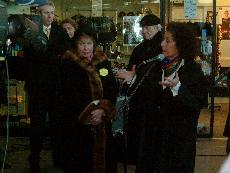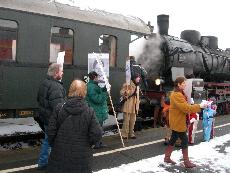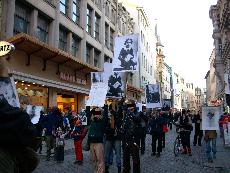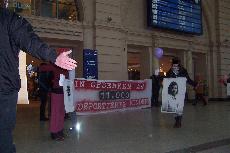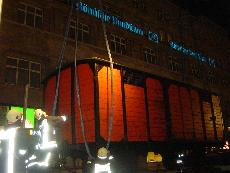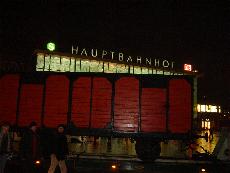Renounced Consensus
BERLIN (Own report) - Numerous coercive measures, evictions by force, carried out by railway personnel and police, alongside bans on speeches and presence on the premises, were the reactions of the directorate of the Deutsche Bahn AG (DB, German Railway Corp.) to the nationwide information activities, that took place on the anniversary of the liberation of Auschwitz, concerning the fate of the 3 million victims of Nazi Deportation. Tens of thousands of Jewish children had also been transported by the DB predecessor, "Deutsche Reichsbahn" to the extermination camps. As reported from Halle, the local railroad management requested the police, standing at the ready, to proceed "with all means necessary" to thwart the commemoration. At the stations Wuerzburg and Schweinfurt the organizers were forbidden to address the passengers with speeches. The occasion was a memorial speech by Dr. Ekkehart Krippendorff, the professor of science em. from Berlin. In Goettingen, railway officials ripped photos and documents concerning the 11,000 deported Jewish children from a provisional exhibition wall in the central station. In Frankfurt a. M. the local railway management attacked members of a citizens' initiative, who attempted to distribute documentation to the passengers. The repressive measures had been ordained by company headquarters in Berlin. The headquarters in Berlin threatened to evacuate Berlin's Central Station, should a press conference be called there with subsequent information activities. The participation of the chairman of Berlin's Jewish community, Gideon Joffe, and the publicist, Lea Rosh, had been announced. Beate Klarsfeld arrived from Paris at the Berlin Central Station. Railway officials used force to seize a banner. "We are dismayed and ashamed", said the press spokesman of the "Initiative of Eleven Thousand Children". "A democratic consensus has been renounced here, that concerns the history of all of us." German foreign policy.com documents the events with photos and speeches.
During the prelude to the memorials and protests in Berlin's Central Station, the railway director, Hartmut Mehdorn, had sent a written request that the organizers annul their planned press conference and renounce on their plans to inform the passengers. In his letter, on hand at german-foreign-policy.com, Mehdorn refers to the exhibition of the French victim's organization "Fils et Filles des Déportés Juifs de France" (FFDJF), displaying hundreds of photos of the deported Jewish children "as not being seen as very convincing". This devaluation is in reference to exhibit pieces, that have for several years been on display in 18 French railway stations. Elements of the exhibition, created by Serge and Beate Klarsfeld, are in the museum Yad Vashem (Israel) and in the Holocaust Museum Washington (the USA). In March, the extended exhibition will also be on display in the Paris city hall (Hotel de Ville).
Coldly
The director of the "Rail Traffic" sector of the Technical Museum  of Berlin, Alfred Gottwald, expressed views pertaining to the memorial culture of the victims, on the eve of January 27, that were as disparaging as those by Mehdorn. After public pressure became too strong, Mehdorn commissioned Gottwald to prepare a project for the railway.[1] Gottwald, who was commissioned by Mehdorn criticizes the existing French photo exhibition of those liquidated, for showing only "numerous long tables and hundreds of childrens photos" - but without mentioning what the "tables" represent. These are the 85 Nazi Deportation lists, that Serge Klarsfeld reconstructed to wrest these children from their anonymity, on the basis of their names and where they were born. "That may be moving", admits Gottwald coldly, "but that, alone, still doesn't constitute a good exhibition."[2] (Photo: Railway officials in Berlin's Central Station trying to snatch away a banner on January 27. "What the DB does not want to show: 11,000 Jewish children - persecuted, deported, liquidated", is what is written on a large scaled banner. The protest demonstration was successful, after the participants announced, that they were willing, before live cameras, to be carried from the station.)
of Berlin, Alfred Gottwald, expressed views pertaining to the memorial culture of the victims, on the eve of January 27, that were as disparaging as those by Mehdorn. After public pressure became too strong, Mehdorn commissioned Gottwald to prepare a project for the railway.[1] Gottwald, who was commissioned by Mehdorn criticizes the existing French photo exhibition of those liquidated, for showing only "numerous long tables and hundreds of childrens photos" - but without mentioning what the "tables" represent. These are the 85 Nazi Deportation lists, that Serge Klarsfeld reconstructed to wrest these children from their anonymity, on the basis of their names and where they were born. "That may be moving", admits Gottwald coldly, "but that, alone, still doesn't constitute a good exhibition."[2] (Photo: Railway officials in Berlin's Central Station trying to snatch away a banner on January 27. "What the DB does not want to show: 11,000 Jewish children - persecuted, deported, liquidated", is what is written on a large scaled banner. The protest demonstration was successful, after the participants announced, that they were willing, before live cameras, to be carried from the station.)
Emotions
The company leadership has implied several times that the railway's concern  is to avert feelings of sympathy and mourning. This attitude begins now to take shape In the guise of Gottwald, who was designated by the railway. According to Mrs. Klarsfeld, referring to a discussion she had with Gottwald on January 11, he made it obvious "that it is dangerous in Germany, to show photos of Jewish children because one can be accused to stirring up emotions."[3] But how is the fate of tens of thousands of children not to stir emotions? Why are feelings dangerous "in Germany"? Mrs. Klarsfeld and their victim organization made it clear in a statement to the press: "we cannot collaborate with this historian." (Photo: Beate Klarsfeld - left - and Lea Rosh demanding an immediate commemoration of the deportation victims and an equal participation of French and German initiators at Berlin's Central Station.)
is to avert feelings of sympathy and mourning. This attitude begins now to take shape In the guise of Gottwald, who was designated by the railway. According to Mrs. Klarsfeld, referring to a discussion she had with Gottwald on January 11, he made it obvious "that it is dangerous in Germany, to show photos of Jewish children because one can be accused to stirring up emotions."[3] But how is the fate of tens of thousands of children not to stir emotions? Why are feelings dangerous "in Germany"? Mrs. Klarsfeld and their victim organization made it clear in a statement to the press: "we cannot collaborate with this historian." (Photo: Beate Klarsfeld - left - and Lea Rosh demanding an immediate commemoration of the deportation victims and an equal participation of French and German initiators at Berlin's Central Station.)
Applause
In all of the stations and trains, the members of the citizens' initiatives successfully imposed their commemorations and protests in spite of the ban. Between Karlsruhe, Mannheim and Frankfurt a. M.  they organized an information relay and traveled on several Inter-City trains. Photos and leaflets reminded of the deported children. "The Jewish children from Karlsruhe, Mannheim and Frankfurt, who traveled across these tracks to their deaths, could be among us today as great-grandmothers or great-grandfathers, had the democrats of the time, early enough and united resisted the rising fascism,"[4] the passengers were told in a speech, held in an open coach. "There was spontaneous applause in some compartments", reported an employee of the Southwest Radio, who had accompanied the citizens' initiative. (Photo: Participants of the info-relay at Mannheim's Central Station). The mayor of Mannheim, Dr. Peter Kurz, told the audience at the city's Holocaust memorial ceremony: "In view of the German Railway's refusal to display in German stations Beate Klarsfeld's exhibition of over 11,000 Jewish children, who were deported into the extermination camps by the Reichsbahn, I would like to join the numerous appeals to Mr. Mehdorn (...) it is not about a transmission of guilt, but about today's responsibility. It is unfortunate, that this must be made clear to a public enterprise." Already on the eve of January 27, citizens' initiatives in Frankfurt a. M. assembled in front of the local stock exchange and announced, that they would "critically accompany" the forthcoming sale of company shares.
they organized an information relay and traveled on several Inter-City trains. Photos and leaflets reminded of the deported children. "The Jewish children from Karlsruhe, Mannheim and Frankfurt, who traveled across these tracks to their deaths, could be among us today as great-grandmothers or great-grandfathers, had the democrats of the time, early enough and united resisted the rising fascism,"[4] the passengers were told in a speech, held in an open coach. "There was spontaneous applause in some compartments", reported an employee of the Southwest Radio, who had accompanied the citizens' initiative. (Photo: Participants of the info-relay at Mannheim's Central Station). The mayor of Mannheim, Dr. Peter Kurz, told the audience at the city's Holocaust memorial ceremony: "In view of the German Railway's refusal to display in German stations Beate Klarsfeld's exhibition of over 11,000 Jewish children, who were deported into the extermination camps by the Reichsbahn, I would like to join the numerous appeals to Mr. Mehdorn (...) it is not about a transmission of guilt, but about today's responsibility. It is unfortunate, that this must be made clear to a public enterprise." Already on the eve of January 27, citizens' initiatives in Frankfurt a. M. assembled in front of the local stock exchange and announced, that they would "critically accompany" the forthcoming sale of company shares.
Memory forbade
At the beginning of the commemoration ceremony at Wuerzburg's Central Station, the station management tried to influence the contents of the planned speeches and insisted that they be held "in the required brevity."  This was referring to the speeches of the chairman of the Jewish community in Wuerzburg, Dr. Josef Schuster, the representative of the "Initiative of Eleven Thousand Children", Professor em. Dr. Ekkehart Krippendorff, as well as the city's Protestant and Catholic deans. The railway management was displeased at references in the speeches to the DB AG and threatened to apply their rights of domestic authority and forbade further speeches. Also at the Schweinfurt station, the "Memory Train's" [5] destination, the organizers were forbidden from making contact with the passengers. (Photo: In the historical cars of the "Memory Train" photos and documents of the deportations from Main-Franconia and from Nazi occupied Paris. Info material was distributed at the stations. By renting a railway line, it was possible to successfully circumvent the exhibition boycott imposed by the Railway management in Berlin.) The DB AG's ban on speeches made it impossible for the representative of the Jewish community to hold his speech at Schweinfurt's Central Station. german-foreign-policy.com documents the complete text in the appendix.
This was referring to the speeches of the chairman of the Jewish community in Wuerzburg, Dr. Josef Schuster, the representative of the "Initiative of Eleven Thousand Children", Professor em. Dr. Ekkehart Krippendorff, as well as the city's Protestant and Catholic deans. The railway management was displeased at references in the speeches to the DB AG and threatened to apply their rights of domestic authority and forbade further speeches. Also at the Schweinfurt station, the "Memory Train's" [5] destination, the organizers were forbidden from making contact with the passengers. (Photo: In the historical cars of the "Memory Train" photos and documents of the deportations from Main-Franconia and from Nazi occupied Paris. Info material was distributed at the stations. By renting a railway line, it was possible to successfully circumvent the exhibition boycott imposed by the Railway management in Berlin.) The DB AG's ban on speeches made it impossible for the representative of the Jewish community to hold his speech at Schweinfurt's Central Station. german-foreign-policy.com documents the complete text in the appendix.
Chants

 Photos: The local initiative protested in downtown Halle, after being expelled from the train station under threat of police intervention. The demonstrators reacted with chants to the exhibition boycott of the DB AG, which will soon be marketed at the stock exchange, but refuses a current and joint memorial ceremony for the deported Jewish children: "if you go on the stock exchange, you must take us along." Downtown the demonstrators showed photos of the deported. The initiative distributed 2000 leaflets.
Photos: The local initiative protested in downtown Halle, after being expelled from the train station under threat of police intervention. The demonstrators reacted with chants to the exhibition boycott of the DB AG, which will soon be marketed at the stock exchange, but refuses a current and joint memorial ceremony for the deported Jewish children: "if you go on the stock exchange, you must take us along." Downtown the demonstrators showed photos of the deported. The initiative distributed 2000 leaflets.
Railroad Remembers

 Photo: In Cologne the initiative "Railroad Remembers" succeeded, in cooperation with numerous local working groups, in setting up in front of the entrance to Cologne's Central Station this "Reichsbahn" railroad car. The historical car was lifted with a special crane onto a rail piling. In the current week, informative and commemoration activities will take place here, to honor numerous groups of deportation victims of the Nazi "Reichsbahn".
Photo: In Cologne the initiative "Railroad Remembers" succeeded, in cooperation with numerous local working groups, in setting up in front of the entrance to Cologne's Central Station this "Reichsbahn" railroad car. The historical car was lifted with a special crane onto a rail piling. In the current week, informative and commemoration activities will take place here, to honor numerous groups of deportation victims of the Nazi "Reichsbahn".
You can read here the speech that the chairman of Wuerzburg's Jewish community, was prohibited from holding by the ban on speeches at the Schweinfurt station.
You can read Prof. em. Dr. Ekkehart Krippendorffs speech here.
[1] see also Gefährdete Renditen
[2] Endstation Ausschwitz; Tagesspiegel 27.01.2007
[3] Pressemitteilung 25.01.2007
[4] Den vollständigen Text finden Sie hier
[5] see also Is Mr. Mehdorn an Anti-Semite?

